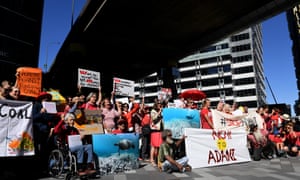Extract from The Guardian
Multinational says deadline was predicated on a subsidised Australian government loan
Adani’s plan to build Australia’s largest coalmine has suffered
another setback. The company has abandoned its March deadline for
securing financing for the first stage of the Carmichael mine.
In October, Jeyakumar Janakaraj, the chief executive of Adani Australia, told Reuters it aimed to settle financing for the project by March 2018.
Today, as reported in Fairfax Media, Adani has confirmed it would not be meeting that deadline.
A spokeswoman for Adani Australia told the Guardian the March deadline was predicated on the company receiving a subsidised loan from the Australian government through the Northern Australia Infrastructure Facility (Naif). Since the Queensland Labor government has said it would veto any such loan, she said the financing timeline was now pushed back.
The spokeswoman would not confirm what the new funding timeline was, saying it was “commercial in confidence”.
“We remain 100% committed to the Carmichael project. We are confident of securing financing,” she said.
Adani’s missed funding deadline is just the latest in a string of setbacks.
Labor leader Bill Shorten has said the project is “just another project” and noted it must stack up economically and environmentally.
Other senior labor leaders have gone further. The deputy leader, Tanya Plibersek, has been telling members of the public who write to her office she does “not believe that the Carmichael mine project stacks up economically or environmentally”.
And Mark Butler, the opposition spokesman for climate change, has doubled down on earlier comments, saying the project was not in the national interest, and it was not “what the world needs to do … to keep global warming well below two degrees”.
In October, Jeyakumar Janakaraj, the chief executive of Adani Australia, told Reuters it aimed to settle financing for the project by March 2018.
Today, as reported in Fairfax Media, Adani has confirmed it would not be meeting that deadline.
A spokeswoman for Adani Australia told the Guardian the March deadline was predicated on the company receiving a subsidised loan from the Australian government through the Northern Australia Infrastructure Facility (Naif). Since the Queensland Labor government has said it would veto any such loan, she said the financing timeline was now pushed back.
The spokeswoman would not confirm what the new funding timeline was, saying it was “commercial in confidence”.
“We remain 100% committed to the Carmichael project. We are confident of securing financing,” she said.
Adani’s missed funding deadline is just the latest in a string of setbacks.
- In December, the Queensland premier, Annastacia Palaszczuk, announced she would veto any federal loan to the project.
- What Adani still describes on its website as the project’s “biggest deal”, a $2bn deal with Downer EDI to construct and operate the mine, was scrapped when Adani announced it could no longer afford the contract.
- All four big Australian banks previously ruled out funding the project, leading Adani to search for loans from foreign banks. Dozens of international banks had also ruled out funding.
- Amid negotiations with Chinese state-owned enterprises, which might have secured funding from huge Chinese banks, the Chinese embassy in Australia announced no Chinese bank would fund the project.
- Adani has also had to downgrade the predicted output of the mine, and its own consultants have contradicted Adani’s claims of the number of jobs the project would create.
Labor leader Bill Shorten has said the project is “just another project” and noted it must stack up economically and environmentally.
Other senior labor leaders have gone further. The deputy leader, Tanya Plibersek, has been telling members of the public who write to her office she does “not believe that the Carmichael mine project stacks up economically or environmentally”.
And Mark Butler, the opposition spokesman for climate change, has doubled down on earlier comments, saying the project was not in the national interest, and it was not “what the world needs to do … to keep global warming well below two degrees”.

No comments:
Post a Comment